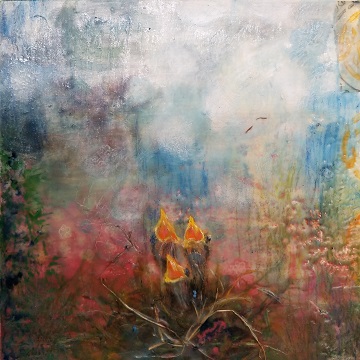 Nest
#6
Nest
#62019, beeswax, oil, mixed media on panel, 6" x 6"
 Nest
#6
Nest
#6
2019, beeswax, oil, mixed media on panel, 6" x 6"
sold
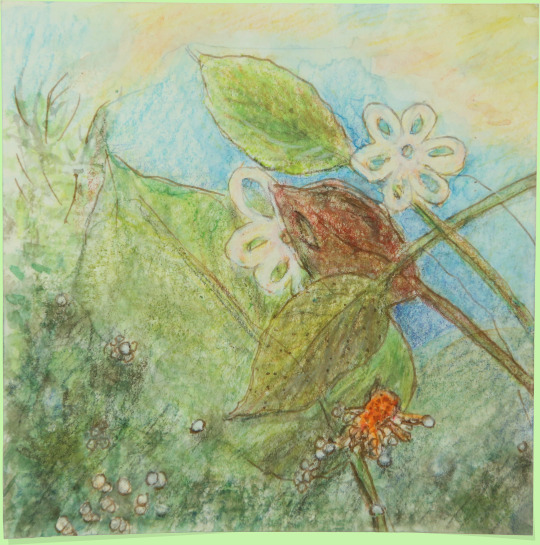 Garden
#1
Garden
#1
2019, watercolor and colored pencil on paper 4" x 4" (first
in a series of six, framed together in sequence)
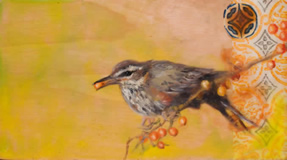 Bird
#4
Bird
#4
2008, beeswax, oil, mixed media on panel, 5" x 9"
(photographic reference not known)
sold
 Bird #13
Bird #13
2010, beeswax, oil, mixed media on panel, 9" x 5"
sold
(photographic reference: Anna's Hummingbird by
Bert Katzung, used with permission, www.astronomy-images.com)
See interesting science
video on hummingbird (and dog) tongues -
http://www.sciencefriday.com/program/archives/201105276
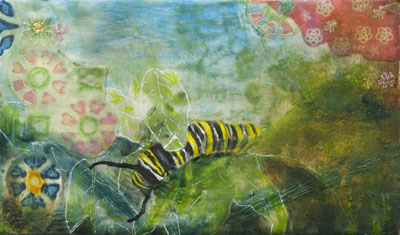 Caterpillar #1
Caterpillar #1
2009, wax, oil, mixed media on panel, 2" x 4"
(photographic reference not known)
sold
 Bird
#8
Bird
#8
2009, beeswax, oil, mixed media on panel, 5" x 9"
(photo reference: Anna's Hummingbird by Bert
Katzung, used with permission, www.astronomy-images.com)
sold
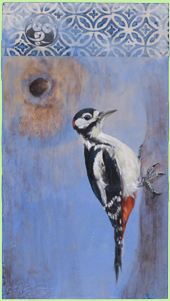 Bird #2
Bird #2
2008, beeswax, oil, mixed media on panel, 9" x 5"
(photographic reference not known)
sold
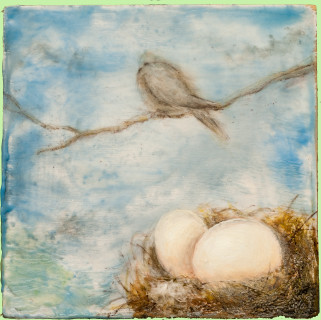 Nest
#2
Nest
#2
2009, beeswax, oil, mixed media on panel, 4" x 4"
nfs
 Bird
#17 American Goldfinch
Bird
#17 American Goldfinch
2010, beeswax, oil, mixed media on panel, 4" x 4"
(photograph reference from fotosearch.com 19818853)
sold
(custom framed inkjet encaustic available, $200)
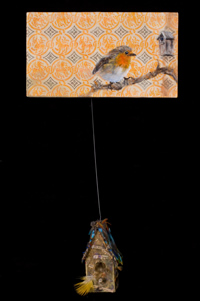 Bird #1 & Bird House
†
Bird #1 & Bird House
†
2008, beeswax, oil, mixed media on birch panel, (in two parts), Bird: 5" x
9" & Bird House: 2.5" x 4"
(photographic references not known)
sold
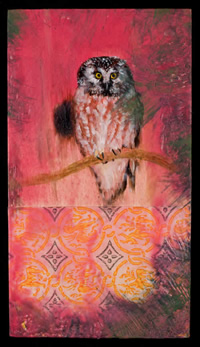 Bird #5
Bird #5
2008, beeswax, oil, mixed media on panel, 9" x 5"
(photographic reference: Boreal owl, aegolis funereus, by Steven Katovich, USDA Forest Service, used with permission, image # 1388020, www.Bugwood.org)
sold
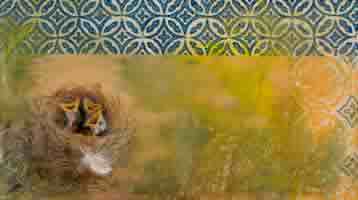 Nest
#1
Nest
#1
2008, beeswax, oil, mixed media on panel, 5" x 9"
(photographic reference not known)
sold
(an enlarged, waxed and framed copy is available for sale, plus a printed detail of this nest on canvas, 8 by 10 in.)
 Bee #1 2008, beeswax, oil,
mixed media on panel, 9" x 5"
Bee #1 2008, beeswax, oil,
mixed media on panel, 9" x 5"
sold
Birds #7 2009, beeswax, oil, gold leaf mixed media on panel, 14" x 11"
sold
(Red cardinals in flight, reference photographs by R.W. Scott, www.gregscott.com; used with permission)
Professionally framed by David Fallis
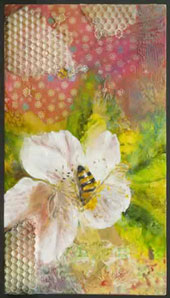 Bee
#2 2000,beeswax, oil, gold leaf mixed media on panel, 9" x 5"
Bee
#2 2000,beeswax, oil, gold leaf mixed media on panel, 9" x 5"
sold
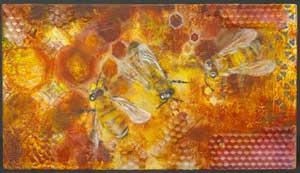 Bees #3 ‡
Bees #3 ‡
2008, beeswax, oil, gold leaf mixed media on custom cradled birch panel,
5" x 9"x 1"
This was my first time using gold leaf, and I love the way it reflects, reminiscent of the warmth of honey!
$375
While in the U.K., I glimpsed some wild bird images on the front page of a London newspaper, which was in the recycling bin. At around that time, our newly-planted garden in San Francisco had begun to fill with its own wild occupants and visitors (one morning, just as I stepped outside, a lively green snake and I surprised each other!). After I returned home with these pages, saved in my sketchbook, I began painting the Garden Variety mixed media series.
Decorative Italian or Japanese papers, looking much like wallpaper, suggest an element of human domesticity and the indoors. I placed them in layers of beeswax encaustic over birch wood panels, sometimes adding small feathers, glitter, or flakes of metallic leaf, etc. Then I painted the main images in oils. I'll often go over the final surface with pen and ink, and/or colored pencil, after the paint has cured, which takes months.
Aware of our own species' domination of its home planet--and upon learning of Colony Collapse Disorder and other threats to critical animal species--perhaps my psyche added background depictions of disappearing tree branches, nests, holes in tree trunks, altered honeycomb, or ephemeral bird houses, in an attempt to convey the increasing fragility of wild habitats.
Beeswax smells great when it's heated for application, reminding me of my Waldorf school days, and it lends a ephemeral, mysterious quality to the finished imagery, as it tends to pull some of the oil paint into its surface. I find this tremendously appealing.
† The miniature bird house at the bottom of "Bird #1 & Bird House" was a cardboard craft multiple. I covered it with gold leaf and small, rainbow-colored bird feathers (given to me by a neighbor friend with an aviary). I added words that I associate with domesticity, which I had cut out of newspapers. I placed two unfertilized finch eggs (from the same neighbor ) inside the tiny birdhouse doorway, nested into a soft dog-hair and dryer-lint bedding (not recommended for real nestlings!). All is held in place by a small screen of gauze ribbon.
I always appreciate assistance identifying any photographic references, so that I can add a photographer credit for their image.
One of the feathers in Nest #2 is real, found near an abandoned nest in a park near my studio,, The other feather is painted.
© Copyright 2008-2023, Deborah Howard-Page. All rights reserved.